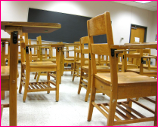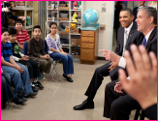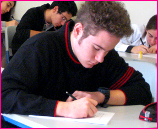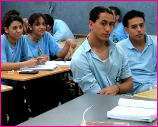Posted on September 6th, 2010 by ASEE

Despite the growing importance of information technology, schools – and students – still resist computer science curricula in K-12 public schools. A recent Google-sponsored conference at the University of Washington suggested ways to combat the stereotypes and increase appeal.
Read More
Filed under: K-12 Education News | Comments Off on Not Just Codes and Programming
Tags: Computer Engineering, Computer Science, Research on Learning
Posted on September 6th, 2010 by Jaimie Schock
 Use of value-added modeling systems to assess teacher performance is rapidly increasing. But do they provide a fair and accurate account of teacher competency?
Use of value-added modeling systems to assess teacher performance is rapidly increasing. But do they provide a fair and accurate account of teacher competency?
Read More
Filed under: K-12 Education News | Comments Off on Opinions Differ on Teacher Evaluations
Tags: Education Policy, Research on Learning, Teachers, U. S. Department of Education
Posted on September 6th, 2010 by Jaimie Schock
 60 freshman at Maryland’s North Harford High School will be the first to join a new Natural Resources and Agricultural Sciences program, spending time outside the classroom in barns, pastures, and fields to learn about farming and the environment.
60 freshman at Maryland’s North Harford High School will be the first to join a new Natural Resources and Agricultural Sciences program, spending time outside the classroom in barns, pastures, and fields to learn about farming and the environment.
Read More
Filed under: K-12 Education News | Comments Off on Science Class in Fields and Forests
Tags: Agricultural, Environmental Engineering, Environmental science, Programs for Students
Posted on September 6th, 2010 by Jaimie Schock
 States across the country have long supported cutting classroom size to enhance learning. But given the tough economic climate and continuing state budget cuts, that trend is likely to be reversed, with class sizes expected to inch back up. A bad thing? Maybe not.
States across the country have long supported cutting classroom size to enhance learning. But given the tough economic climate and continuing state budget cuts, that trend is likely to be reversed, with class sizes expected to inch back up. A bad thing? Maybe not.
Read More
Filed under: K-12 Education News | Comments Off on Small Class Sizes Reconsidered
Tags: Education Policy, Elementary Education, Public Policy, Research on Learning
Posted on September 6th, 2010 by Jaimie Schock
 Principal Penelope Eucker worries that America no longer produces enough scientists and innovators. She hopes to counteract this trend at her magnet STEM school through a hands-on, science-based curricula designed with help from local business and technology experts.
Principal Penelope Eucker worries that America no longer produces enough scientists and innovators. She hopes to counteract this trend at her magnet STEM school through a hands-on, science-based curricula designed with help from local business and technology experts.
Read More
Filed under: K-12 Education News | Comments Off on K-8 School Principal Aims for “Sputnik 2.0”
Tags: Education Policy, Public Policy
Posted on August 30th, 2010 by Jaimie Schock
 The District of Columbia, Florida, Georgia, Hawaii, Massachusetts, Maryland, New York, North Carolina, Ohio, and Rhode Island have emerged as winners of the U.S. Department of Education’s $4.35 billion Race to the Top grant competition. The ten will divvy up $3.4 billion in education grants. Not surprisingly, the results were met with a wave of criticisms and finger-pointing.
The District of Columbia, Florida, Georgia, Hawaii, Massachusetts, Maryland, New York, North Carolina, Ohio, and Rhode Island have emerged as winners of the U.S. Department of Education’s $4.35 billion Race to the Top grant competition. The ten will divvy up $3.4 billion in education grants. Not surprisingly, the results were met with a wave of criticisms and finger-pointing.
Read More
Filed under: K-12 Education News | Comments Off on 10 Winners in Race to the Top
Tags: Education Policy, Grant Opportunities, Public Policy, U. S. Department of Education
Posted on August 30th, 2010 by Jaimie Schock
 A main education goal of the White House is for every American high school student to graduate career- or college-ready. New data from the ACT college entrance exam show just what an uphill battle that will be: fewer than 25 percent of 2010 high school graduates had the academic skills to pass college entry-level courses in all four categories tested.
A main education goal of the White House is for every American high school student to graduate career- or college-ready. New data from the ACT college entrance exam show just what an uphill battle that will be: fewer than 25 percent of 2010 high school graduates had the academic skills to pass college entry-level courses in all four categories tested.
Read More
Filed under: K-12 Education News | 1 Comment »
Tags: Education Policy, Public Policy, Research on Learning, Testing
Posted on August 30th, 2010 by Jaimie Schock
 The country’s most expensive public school ever, the Robert F. Kennedy Community Schools, opens its doors next month in Los Angeles. Built on the remains of the old Ambassador Hotel, where RFK was assassinated in 1968, it will accommodate 4,200 K-12 students. The pricetag? An eye-popping $578 million.
The country’s most expensive public school ever, the Robert F. Kennedy Community Schools, opens its doors next month in Los Angeles. Built on the remains of the old Ambassador Hotel, where RFK was assassinated in 1968, it will accommodate 4,200 K-12 students. The pricetag? An eye-popping $578 million.
Read More
Filed under: K-12 Education News | Comments Off on Pricey Public School Raises Objections
Tags: education firsts, Education Policy
Posted on August 30th, 2010 by Jaimie Schock
 Young students are fascinated by science and very open to learning. But as they age, that interest and curiosity tends to wane — a fact too often reflected in test scores. In Texas, only 67 percent of students pass the science portion of the Texas Assessment of Knowledge and Skills exam, while 90 percent pass the English component.
Young students are fascinated by science and very open to learning. But as they age, that interest and curiosity tends to wane — a fact too often reflected in test scores. In Texas, only 67 percent of students pass the science portion of the Texas Assessment of Knowledge and Skills exam, while 90 percent pass the English component.
Read More
Filed under: K-12 Education News | Comments Off on Kids Love Science, Teens Less So
Tags: Research, Research on Learning, Science Education, Science Teachers, Teacher Training










 Use of value-added modeling systems to assess teacher performance is rapidly increasing. But do they provide a fair and accurate account of teacher competency?
Use of value-added modeling systems to assess teacher performance is rapidly increasing. But do they provide a fair and accurate account of teacher competency?  60 freshman at Maryland’s North Harford High School will be the first to join a new Natural Resources and Agricultural Sciences program, spending time outside the classroom in barns, pastures, and fields to learn about farming and the environment.
60 freshman at Maryland’s North Harford High School will be the first to join a new Natural Resources and Agricultural Sciences program, spending time outside the classroom in barns, pastures, and fields to learn about farming and the environment. States across the country have long supported cutting classroom size to enhance learning. But given the tough economic climate and continuing state budget cuts, that trend is likely to be reversed, with class sizes expected to inch back up. A bad thing? Maybe not.
States across the country have long supported cutting classroom size to enhance learning. But given the tough economic climate and continuing state budget cuts, that trend is likely to be reversed, with class sizes expected to inch back up. A bad thing? Maybe not. Principal Penelope Eucker worries that America no longer produces enough scientists and innovators. She hopes to counteract this trend at her magnet STEM school through a hands-on, science-based curricula designed with help from local business and technology experts.
Principal Penelope Eucker worries that America no longer produces enough scientists and innovators. She hopes to counteract this trend at her magnet STEM school through a hands-on, science-based curricula designed with help from local business and technology experts. The District of Columbia, Florida, Georgia, Hawaii, Massachusetts, Maryland, New York, North Carolina, Ohio, and Rhode Island have emerged as winners of the U.S. Department of Education’s $4.35 billion Race to the Top grant competition. The ten will divvy up $3.4 billion in education grants. Not surprisingly, the results were met with a wave of criticisms and finger-pointing.
The District of Columbia, Florida, Georgia, Hawaii, Massachusetts, Maryland, New York, North Carolina, Ohio, and Rhode Island have emerged as winners of the U.S. Department of Education’s $4.35 billion Race to the Top grant competition. The ten will divvy up $3.4 billion in education grants. Not surprisingly, the results were met with a wave of criticisms and finger-pointing. A main education goal of the White House is for every American high school student to graduate career- or college-ready. New data from the ACT college entrance exam show just what an uphill battle that will be: fewer than 25 percent of 2010 high school graduates had the academic skills to pass college entry-level courses in all four categories tested.
A main education goal of the White House is for every American high school student to graduate career- or college-ready. New data from the ACT college entrance exam show just what an uphill battle that will be: fewer than 25 percent of 2010 high school graduates had the academic skills to pass college entry-level courses in all four categories tested. The country’s most expensive public school ever, the Robert F. Kennedy Community Schools, opens its doors next month in Los Angeles. Built on the remains of the old Ambassador Hotel, where RFK was assassinated in 1968, it will accommodate 4,200 K-12 students. The pricetag? An eye-popping $578 million.
The country’s most expensive public school ever, the Robert F. Kennedy Community Schools, opens its doors next month in Los Angeles. Built on the remains of the old Ambassador Hotel, where RFK was assassinated in 1968, it will accommodate 4,200 K-12 students. The pricetag? An eye-popping $578 million. Young students are fascinated by science and very open to learning. But as they age, that interest and curiosity tends to wane — a fact too often reflected in test scores. In Texas, only 67 percent of students pass the science portion of the Texas Assessment of Knowledge and Skills exam, while 90 percent pass the English component.
Young students are fascinated by science and very open to learning. But as they age, that interest and curiosity tends to wane — a fact too often reflected in test scores. In Texas, only 67 percent of students pass the science portion of the Texas Assessment of Knowledge and Skills exam, while 90 percent pass the English component.